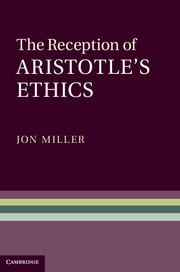Book contents
- The Reception of Aristotle's Ethics
- Contents
- Notes on contributors
- Acknowledgments
- A note on abbreviations and transliteration
- Introduction
- Chapter 1 The Nicomachean Ethics in Hellenistic philosophy
- Chapter 2 The transformation of Aristotle's ethics in Roman philosophy
- Chapter 3 Aristotelian ethics in Plotinus
- Chapter 4 St. Augustine's appropriation and transformation of Aristotelian eudaimonia
- Chapter 5 The Arabic and Islamic reception of the Nicomachean Ethics
- Chapter 6 Maimonides’ appropriation of Aristotle's ethics
- Chapter 7 The relation of prudence and synderesis to happiness in the medieval commentaries on Aristotle's ethics
- Chapter 8 Using Seneca to read Aristotle
- Chapter 9 Aristotle's Ethics in the Renaissance
- Chapter 10 The end of ends? Aristotelian themes in early modern ethics
- Chapter 11 Affective conflict and virtue
- Chapter 12 Kant and Aristotle on ethics
- Chapter 13 The fall and rise of Aristotelian ethics in Anglo-American moral philosophy
- Bibliography
- Index
Chapter 4 - St. Augustine's appropriation and transformation of Aristotelian eudaimonia
Published online by Cambridge University Press: 05 February 2013
- The Reception of Aristotle's Ethics
- Contents
- Notes on contributors
- Acknowledgments
- A note on abbreviations and transliteration
- Introduction
- Chapter 1 The Nicomachean Ethics in Hellenistic philosophy
- Chapter 2 The transformation of Aristotle's ethics in Roman philosophy
- Chapter 3 Aristotelian ethics in Plotinus
- Chapter 4 St. Augustine's appropriation and transformation of Aristotelian eudaimonia
- Chapter 5 The Arabic and Islamic reception of the Nicomachean Ethics
- Chapter 6 Maimonides’ appropriation of Aristotle's ethics
- Chapter 7 The relation of prudence and synderesis to happiness in the medieval commentaries on Aristotle's ethics
- Chapter 8 Using Seneca to read Aristotle
- Chapter 9 Aristotle's Ethics in the Renaissance
- Chapter 10 The end of ends? Aristotelian themes in early modern ethics
- Chapter 11 Affective conflict and virtue
- Chapter 12 Kant and Aristotle on ethics
- Chapter 13 The fall and rise of Aristotelian ethics in Anglo-American moral philosophy
- Bibliography
- Index
Summary
Introduction
The earliest known Latin version of Aristotle's Nicomachean Ethics was produced from the Greek by an anonymous translator in the twelfth century. This version, however, was incomplete and it was not until about 1246 that a complete version was translated by Robert Grosseteste. By 1260, the revised version of William of Moerbeke was available and circulated widely over the following decades. Thus, Aristotle's text became known to Latin readers piecemeal over the span of a generation and did not begin to have a serious impact on moral philosophy in the Latin West until the second half of the thirteenth century. Once the naturalistic account of virtue contained in the Nicomachean Ethics became known, it significantly changed the philosophical landscape. Prior to the recovery of Aristotle's text, Latin thinkers showed little interest in naturalistic accounts of moral goodness, focusing instead on the necessity of divine assistance for the morally good life. This theological orientation was generally attributed to the influence of Augustine in the medieval monastic schools. It was not until the revival of Aristotelian naturalism by Albertus Magnus that the Nicomachean Ethics began to exert a philosophical influence in the medieval universities.
The reception of Aristotle's moral philosophy in the thirteenth century, then, marks a watershed in the history of Western ethics. Yet, this development raises the question of the extent to which Augustine's approach to moral philosophy was influenced by or departed from the naturalistic account of human happiness found in the Nicomachean Ethics. If the theological ethics of the medieval monastic schools was dominated by an Augustinian approach, then determining Augustine's place in the history of the reception of Aristotle's text is crucial. Moreover, it has been recently argued that Aristotle's account of virtue and eudaimonia was available in the twelfth century from sources other than the text of the Nicomachean Ethics itself, notably Aristotle's logical works and Cicero's De inventione. As some of these works were available to Augustine in the fourth century, the Augustinian synthesis of the early medieval schools may have already incorporated elements of Aristotle's ethics.
- Type
- Chapter
- Information
- The Reception of Aristotle's Ethics , pp. 67 - 84Publisher: Cambridge University PressPrint publication year: 2012
- 2
- Cited by



